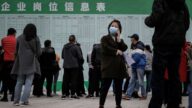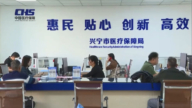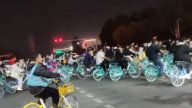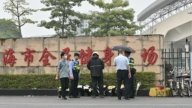【新唐人2011年5月3日讯】在“五一”国际劳动节之际,各国劳工举行了纪念游行。不过中国的庆祝活动却基本是“动口不动手”。中共官方的《人民日报》发表了庆祝劳动节的社论。但是,中国劳工权益活动人士认为,中国工人还在为争取更好的权益,并为了更好的工作条件而抗争,值得庆祝的事情不太多。
五一国际劳动节,世界各地都有纪念五一的游行活动。今年各国游行示威最突出的要求,是改善劳工条件,提高工资水平。比如菲律宾数千民众集会游行,反对政府的移民政策,要求增加工资;韩国五万民众也在首都集会,呼吁改善就业,提高工资。
不过在中国,五一劳动节的庆祝活动基本是体现在媒体或领导人的慰问与祝贺,普通民众则利用五一假期外出旅游。
这一看似微妙的差别,实际上显示了官方“维稳”心理和中国工人权益的冲突。在“五一”期间,中国工人不仅无法获得批准,举行维护自己权利的游行,国内的记者随机调查还发现:近半数受访者已经不知道,“五一”节,源于 1886年美国芝加哥城的工人“维权”运动,也就是为争取 8小时工作制而举行的大罢工。“五一”在中国已经成了休闲购物节,而失去了其抗争的意义。
在“五一”之际,官媒《人民日报》发表了庆祝劳动节的社论,呼吁各级党委和政府要“始终站在工人阶级和劳动群众的立场,切实解决他们最关心最直接最现实的利益问题。”
但长期关注中国劳工问题的组织“中国劳工观察”执行主任李强说,实际情况并非如此,在大陆出现劳资纠纷时,地方政府首先考虑的是维稳,怕农民工的罢工引起工潮,在地方政府的干预之下,农民工就更没有办法去维权。
李强表示,中国的工人没有什么可以值得庆祝的,因为在一个名义上,以工人阶级为领导的共产党国家,工人在中国却是最没有权力的一个群体。
近30年来,中国劳工工资的涨幅远远赶不上物价上涨的水平,因此劳工获得的经济利益其实是在逐步下降。
虽然中国的法律名义上规定,每一个工厂只要有25名工会会员,就可以成立自己的工会,但是由于没有相应的立法保障,加入工会的工人还可能受到资方的报复,导致工人们不敢成立工会或是参加工会活动。
“中国劳工观察”通过公开信息统计得出,2010年发生的罢工事件一共有66起。而根据独立组织“中国劳工通讯”统计的‘2011年中国工人群体事件地图’显示,截至今年4月底,媒体报导出来的劳工抗争就有47件。李强预计,如果不从根本上解决劳工问题,今后这方面的矛盾只会更加激化。
新唐人记者尚燕、郭敬综合报导。
China’s May Day Conflicts
On May 1st, workers around the world held activities
to commemorate the International Labor Day.
But there were not many activities in China.
The Chinese Communist Party’s (CCP) official
People’s Daily published an editorial celebrating
Labor Day. However, Chinese labor rights activists
say that the Chinese workers are still fighting
for better rights and working conditions,
therefore there is not much to celebrate about.
On May 1st, there were parades all over the world
to commemorate the Labor Day,
with the most prominent requirements being
to improve labor conditions and raise wages.
In the Philippines, thousands of people rallied
to protest the government’s immigration policy
and ask for higher wages. In South Korea,
fifty thousand people gathered in the capital
to call for improved employment and higher wages.
But in China, the May Day celebration is basically
in the media and the leaders’ congratulations notes.
Ordinary people just use the holiday for vacation.
This seemingly subtle difference shows the conflict
between official’s intention to “maintain stability"
and the interests of Chinese workers. In the
May Day period, Chinese workers cannot get
approval to hold a procession to protect their rights.
According to a random survey by Chinese reporters,
nearly half of respondents had no idea May Day
originated from the 1886 Chicago City workers
movement to win the 8-hour working day.
May Day in China has become a time of leisure
for shopping, and lost its significance.
In the May Day occasion, People’s Daily published
an editorial celebrating the Labor Day, calling
for party committees and governments officials
at all levels to “always stand in the position
of the working class and the working masses,
and effectively solve their most direct
and practical concern of interests."
However Li Qiang, CEO of China Labor Watch,
the organizations following China’s labor issues,
said this is not the case. Local governments’ first
consideration during disputes between an employer
and workers is to maintain stability, in fear
of migrant workers strikes. There is even less chance
for more migrant workers to defend their rights.
Li Qiang said workers in China have nothing
to celebrate about. The country is led
by the working class only on words.
Workers have the least power.
In the last 30 years, workers’ wage in China cannot
catch up with price increases. The economic benefit
of Chinese workers is actually decreasing.
Although by the provisions of Chinese law,
workers can set up their own union
as long as there are 25 union members in a plant,
but without corresponding legislative protection,
workers in union may also be subjected to retaliation,
which caused their unwillingness
to establish or join union or union activities.
China Labor Watch concluded from a public survey,
that a total of 66 strikes happened in 2010.
According to an independent organization,
China Labor Bulletin’s 2011 Map of Mass Incidents
of Chinese Workers, there were 47 incidents
involving workers’ protest until the end of April.
Li Qiang expects there can only be further conflicts
provided there is no fundamental resolution
to the existing labor problems.
NTD reporters Shang Yan and Guo Jing



























